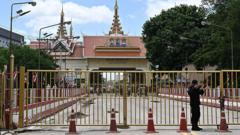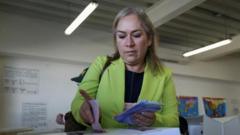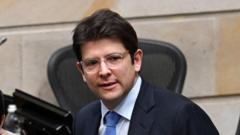Tidjane Thiam's exclusion from the October presidential elections in Ivory Coast, following a court ruling on his citizenship status, illustrates the ongoing challenges to democracy. This situation highlights potential disillusionment among voters and echoes historical identity politics that have previously destabilized the nation.
Challenges for Ivory Coast's Democracy: The Thiam Controversy

Challenges for Ivory Coast's Democracy: The Thiam Controversy
Former finance executive Tidjane Thiam faces exclusion from the presidential race due to citizenship issues, raising questions about the political landscape in Ivory Coast and the implications for democracy.
In Ivory Coast, a country celebrated for its cocoa production and vibrant football culture, the political landscape is facing scrutiny as Tidjane Thiam, a prominent candidate for the presidency, grapples with the repercussions of a recent court ruling on his citizenship. Thiam, who made a name for himself in global finance, has found that his extensive business acumen does not readily translate into political success.
On April 22, a judge determined that Thiam had automatically lost his Ivorian citizenship decades ago after acquiring French nationality, a ruling that has sidelined him from the anticipated elections set for October. Thiam's re-entry into Ivorian politics, after more than twenty years abroad, was initially promising; aligned with the opposition Democratic Party of Ivory Coast (PDCI) and seen as a key figure following the death of former leader Henri Konan Bédié.
However, current President Alassane Ouattara, who is in the final year of his third term, could potentially run for a fourth term, with Thiam’s exclusion creating fears of an election without significant opposition. This scenario risks deepening public disillusionment, particularly among the youth, who represent a large segment of the population, and who may resonate with the anti-establishment sentiments echoed by recent military coups in neighboring West African countries.
The context is critical: Ivory Coast has experienced a tumultuous political history marked by violence and division, stemming from identity politics that previously destabilized the nation. The "ivoirité" law has been instrumental in past exclusions, and Thiam’s current struggle highlights how remnants of such policies continue to shape the political arena.
Legal intricacies further complicate Thiam's plight; with no option for appeal based on the ruling, his hopes rest on political maneuvering and pressure from the populace. His argument emphasizes the absurdity of citizenship laws, pointing out that if the criteria used against him were consistently applied, many players in the national football team would also be deemed ineligible due to dual nationality.
As the political community anticipates the electoral landscape, the possibility remains that compromise solutions may emerge, potentially allowing Thiam and other excluded candidates to participate. However, with limited time until the elections, the specter of unchallenged incumbency looms large, posing significant questions for democracy and governance in Ivory Coast, a nation that aspires to be a model of change and progress in the region.
With a legacy intertwined with national identity and heritage, the unfolding situation prompts questions about the future of Ivorian democracy and the implications for wider West African politics. As local and international observers closely watch developments, the hope for a vibrant democratic process hangs precariously in the balance.



















